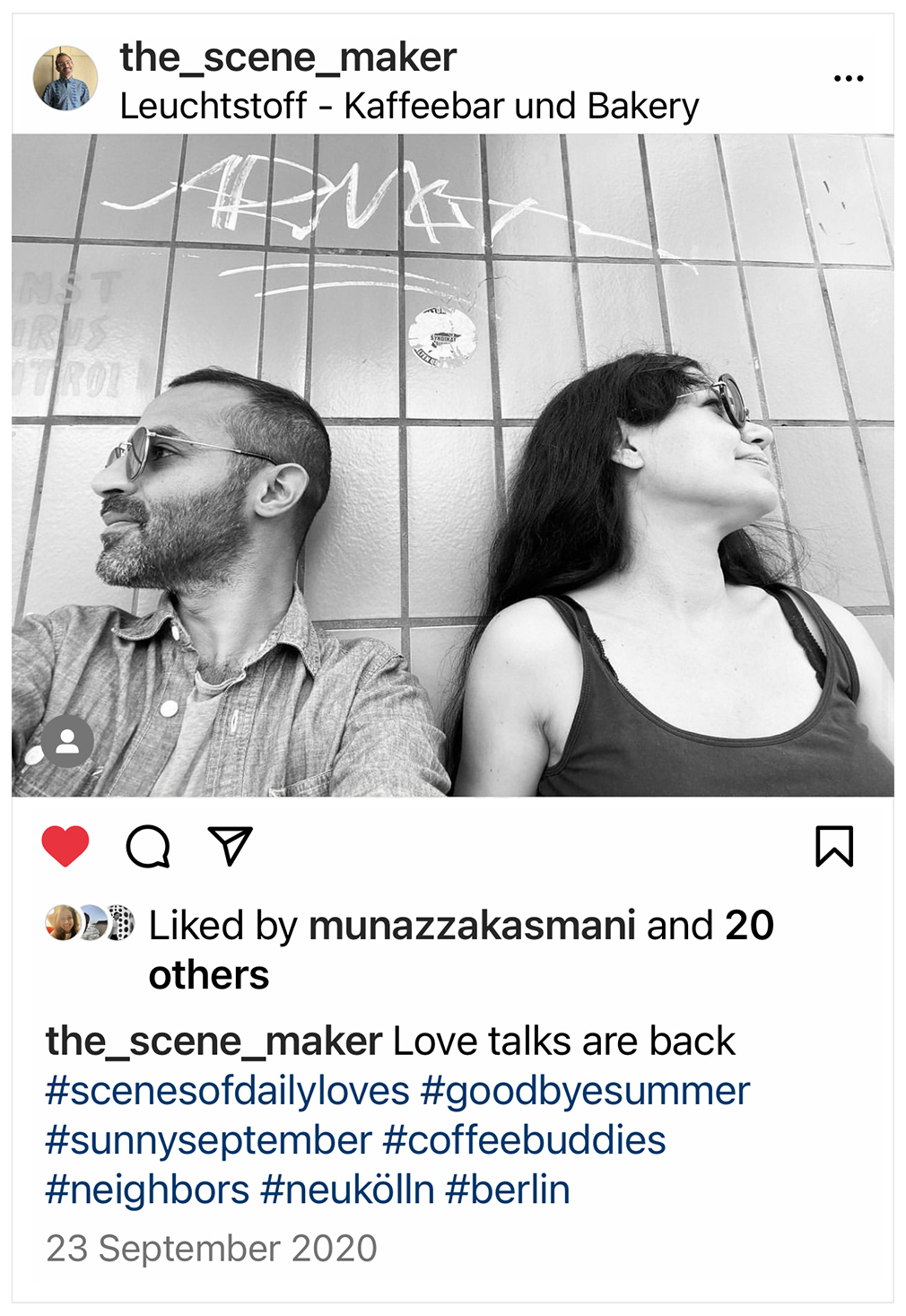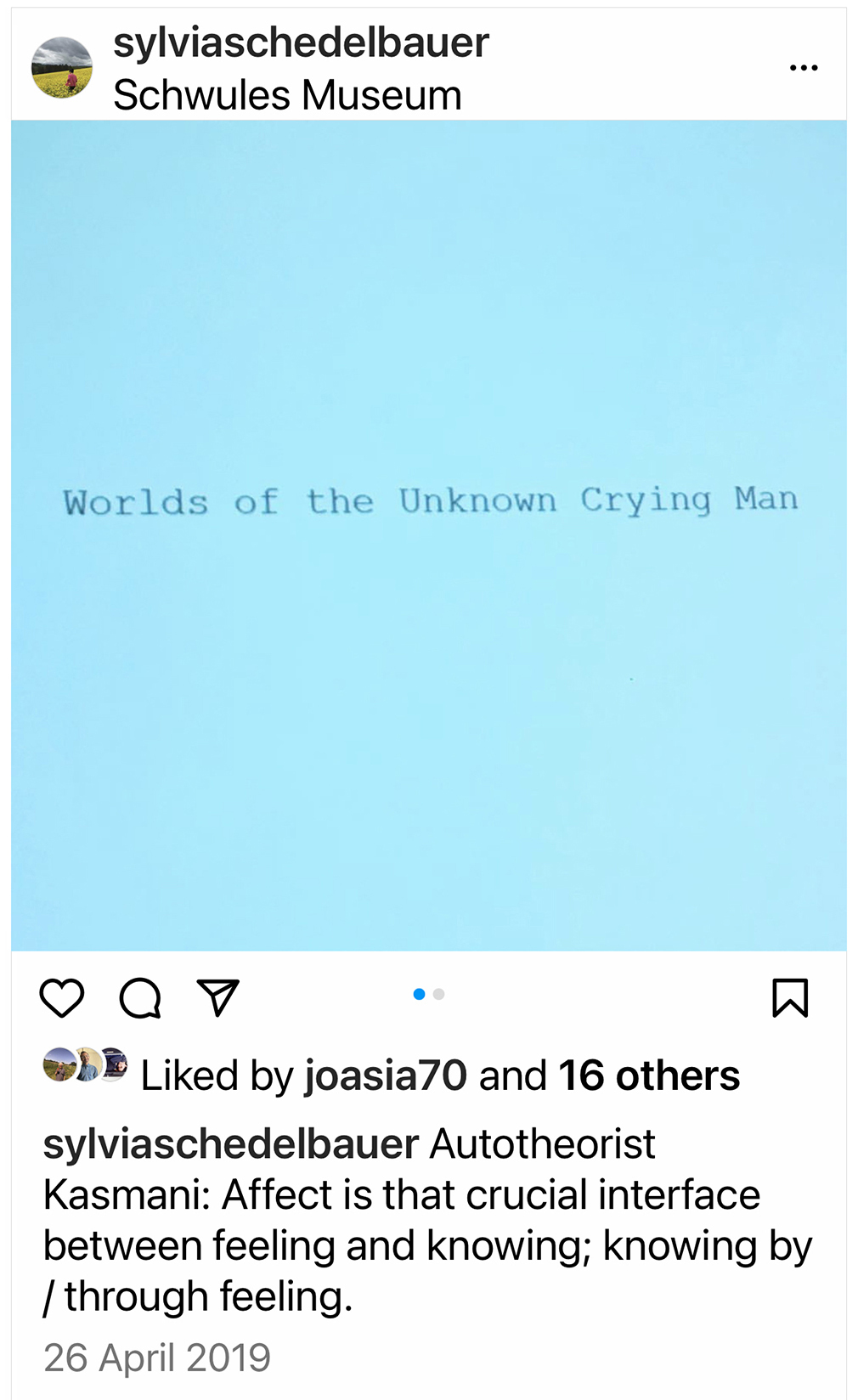All Things Love: An Archipelago

Sylvia: It all started at Leuchtstoff, the cafe in Berlin-Neukölln that had become a daily fixture, the place where a chat with the barista may be the only conversation I had in a day; the neighborhood spot where I went to think, muse, write, and daydream. Turned out it was that kind of space for many, and this is where I met you, Omar, my friend and neighbor, whom I endearingly call Prince Sunshine.
One day I looked up from writing, and there you were, with our mutual friend Aykan, your legs tangled under the table; you looked so light-hearted, casual, happy. After that, we met every day: you were there all day, every day, writing – it was your office! I usually only stopped by for an hour to two, or on occasion longer.
We quickly developed our daily Love Talks, conversations that sometimes lasted ten minutes, sometimes a few hours – we mused on all things love. This went on for about a year, and we periodically joked that we’d have an event series where we would make our conversations public. We wanted to document it, do a podcast, invite friends and inspiring thinkers to be interlocutors. Then I went away for a year, the pandemic happened and here we are. I think back and realize that it’s hard to put into words what the Love Talks were about. They seem elusive, just as love can be.
Omar: Love it.
I love this.
Two of three customized phrases that Gmail offers as quick (though appropriate) responses to your email. How at hand, this love; how ready for use, on our fingertips literally! You say elusive and Billy-Ray Belcourt calls it clumsy. Aren’t we all just trying to name a feeling that we know will always exceed the accounts we are able to give of it? To lean on Jeanette Winterson’s words, “Nothing could be more familiar than love. Nothing else evades us so completely” (2017, 73). Ungainly then, all this love talk!? Far from it, Belcourt points to something more concrete. He imagines the condition of being in love as a spilling over and outside: a body “not living up to the promise of self sovereignty” (2019, 56). Very Berlantian of Belcourt.
If we are to stay with this definition of love – which I truly love – is it not striking to you how often and routinely people around us are able to, even happy and willing to stay non-sovereign, under a spell, in a state of spill – a failing, a feeling shall we say, which I, for the most part, am rather parsimonious with? But you, meine Liebe, know that already :)
S: Of course, how could I forget, it all comes rushing back, the surge of ideas, the flow of inspiration, that curious notion that there’s always an endless stream of things to say.
Love is inspiring?
I love that description of spilling over and being outside! But if we stay with the bodily, it made me think me of cinematic representations of orgasms – as the pioneering porn historian / film scholar Linda Williams wrote (1995, 144-145) – you can always visualize (thus prove) a male climax, but representations of female climaxes have historically been more ambiguous; because more often than not, they have been conceived of as internal, and physically invisible – thus mysterious (and without proof). Am I being too vulgar?
Is love vulgar?
You were obviously being more philosophical. But does that state of spill always denote a failing? I love love’s depth of experience, generosity and time, but you already know that, mein Lieber. Can losing control not be liberating? Can love not trigger catharsis, change, knowledge, healing?

O: To not be able to contain is some kind of failing but you’re also right, failing does not always have to result in failure. To come under the spell of love, as Sufi poetic corpus on divine love will attest, is to open oneself up to profound transformation – catharsis, change, knowledge as you ask – but not without knowing pain, torment, sorrow, turbulence.
To fall in love, to be under a spell, these are reminders that love holds as much as it governs – a courageous thing to embrace – and thus lovers and beloveds are urged to take the long view of the situation, for what is the condition of being smitten if not finding oneself in the midst of a bloom.
S: Ich bin außer mir vor Freude – I am beside myself with joy. The German word außer can be translated as beside, outside, apart, aside. If someone can’t contain their feelings, is that always a failing? Could it not be a thriving?
I think that change is mostly impossible without pain and that it’s hard to choose that path. For many, it can be easier to expect the outside/environment to change, rather than work on the self.
At the time of our Love Talks, I was reading Maggie Nelson’s book The Argonauts. I like her book title’s reference to a quote in Roland Barthes’ autobiography, which in turn is a reference to the Greek myth about a ship called the Argo. The idea that the one who says “I love you” is like “the Argonaut renewing his ship during its voyage without changing its name” (Nelson 2015, 5). In the course of the Argo’s journey, every single plank and nail of the ship was gradually replaced, so it became “an object with no other cause than its name.” (Barthes 1977, 46) I liked the metaphor for love, and for the transformative power of love.
It is the same, yet different;
it is different, yet the same.
Is love paradox?
O: Just this morning, while having coffee and re-reading Billy-Ray Belcourt, I was moved to thinking outside love’s affirmative potentials. “What happens when decolonial love becomes a story you tell yourself, after he falls asleep?” In Love and Other Experiments (2019, 27), the poem from which the above line is excerpted, Belcourt further notes, “sometimes not loving is the most radical thing you can do.”
I am in awe!

S: Love it!
Yes! but also...
not yet!
Now it’s my turn to use the customized phrases that Gmail offers. Your lines beg for further words and context. Could you expand?
O: By relying on the poetic, I was hoping for not having to explain. In its economy of words, poetry stirs more than it steers; evokes rather than explains. Belcourt conveys so much with so little: love, like all affect, is a saturating field of power.
If it is true that for love to take hold, we must question, even relinquish, our existing attachments in favor of new or other ones – going back to the story of Argo – what does the work of such willful unbodying / rebodying look like, and for which bodies? The image of decolonial love in Belcourt – a story we can only tell ourselves in solitude – is a stark reminder that that labor isn’t fairly distributed, or worse still, is impossible to share.
S: When I was brainstorming on titles for my film Labor of Love, I considered its connotations. That film was about love as an expanding feeling, unfolding new inflections — forever different, forever changing. It was also about that effortless feeling of nowness that unfolds when one is in love. But love invariably turns into labor, I think there simply is no possibility for love without some effort, work, negotiation and, maybe, compromise.

I liked the title, Labor of Love, because it acknowledges love as work — and the work love does. I was aware of its historical references to the socio-political campaigns from the second wave feminist movement(s) that discussed the invisible and unpaid labor that women had performed historically; labor that, to this day, remains unpaid, underappreciated, and undervalued.
There was something that resonated with my practice as an experimental filmmaker, and with my personal struggles to keep going for over a decade and a half after graduating from art school. My films didn’t make money, and the financial support was so intermittent, rare and unreliable, it was by no means easy to keep going. But I knew the reason for my devotion:
Films can make a difference.
Films can communicate, they can connect.
Films – like affect, as you made me aware –
can produce a different mode of knowing.
Films can change the fabric of one’s thinking.
Films can have (a proxy) agency.
Watching films can feel like an intimate encounter, like meeting someone on a personal level.
There are a small number films that have impacted me, changed my trajectory, changed the way I see myself and the world. And if my films speak to anyone, if someone can connect with them, if they make a small difference, even to a handful of people, it will have been worth it.
I knew that equating the process of making experimental films with a labor of love was contentious. I was aware of the discourses around precarity, the campaigns to just say ‘no’ to unpaid labor and to refuse showing work in unpaid or underpaid settings. Yet, when I started out as a female experimental filmmaker, being under-recognized seemed par for the course, and I had to choose my battles. It’s my observation and experience that white women may fight twice as hard compared to their male colleagues, and women of color may fight three, four or five times as hard to carve out a path for themselves and find recognition.
How does my history and evolution as an experimental filmmaker intersect with feminist history and unpaid women’s work? I’m not entirely sure, but intuitively, this related. In a way, more often than not, it is expected of me to deliver things for free, make my work available without remuneration, to openly let people consume the work, which, like women’s labor, is seen as a kind of act of love, benefiting others for some kind of greater good.

Anyway, having said all that, there may be a stubborn naïveté, even ignorance at work when I say that I believe it’s possible to share the labor; but it makes me feel vulnerable.
Is love a metaphor?
Is decolonization a metaphor?
Is love incommensurable?
Is love’s labor always asymmetrical?
Uneven?
Unequal?
What are the histories of labors of love?
What are the histories of knowledge production around women’s bodies?
Who controls women’s bodies?
Do women have an unquestioned right to self-governance?
Do women have uncontested opportunities?
How do these stories intersect?
How are we implicated?
Is love about unlearning as much as it is about learning?
Is love not located at the core of (women’s) empowerment?

I’ll double down on what you wrote: lovers and beloveds are urged to be compassionate, mindful, respectful, not only of each other, but also of each other’s histories.
Here’s a poem from the Instagram poet Rupi Kaur:
stay strong through your paingrow flowers from it
you have helped me
grow flowers out of mine so
bloom beautifully
dangerously
loudly
bloom softly
however you need
just bloom

O: Speaking of insta-poets, there’s a poem of mine in Urdu that I had posted on Facebook on November 7, 2012. یہاں سے آگے or “From here onward” was a public text to mark something personal: the birthday of my partner of 7 years in the fateful year we parted ways.
Its refrain چلو پھر شروع کریں ہم or ‘come, let’s begin again’ was back then as much a mourning for that which couldn’t be salvaged of a love as it was insisting on the hope that we would make other loves of it. As fate would have it and as is the nature of posts, the poem was completely and utterly forgotten, lost to memory proper and found only by sheer algorithm when it popped up on my feed 9 years later. What Facebook thought was memory was in fact a ghost dressed in verse.
As I read it anew, again, almost a decade on, I found myself haunted by how love had in fact unmade us and why life wasn’t that gift we once thought was equally shared. Such returns also warranted the acceptance that going forward in life isn’t always a moving on; or, that promises have a way of falling on the wayside; that new beginnings are quite often fictions we craft for ourselves.
Yet move we must, start over we somehow do – at times only conceivable in new or unmarked geographies. It shouldn’t surprise you if I were to say that I cannot think of love or its labors without thinking of location – you are, after all, familiar with my history. You also know that I have often described migrant moving and be/longing in terms of intimacy – a gradual and piecemeal mode of coming close to places, peoples, histories.
I am aware that drawing near to a body, or moving away from another, the politics of intimacy so to speak, isn’t the same as falling for one, the absorbing condition of being in love. And it is the latter image that I want to stay with. Love, if I’m allowed a cheesy quote from a Netflix film, is “a lot like moving to a new country; trying to build something where nothing existed before. It’s hanging on and letting go. It’s messy, it’s beautiful, like any giant leap of faith.” Though if there’s one thing I’ve learnt through migrating, it is that we move with our pasts; ghosts arrive shortly after; and trauma knows no borders.
Still, I love how love in this description stands for an un/settling, moving as much as being moved, at times to our limits if not also to tears; or that it invariably involves the work of building something new, becoming different, queer even to our former straight selves; attaching so as to violate our existing attachments; and above all how true that moving demands that we remain faithful, committed to where a path will or will not take us.
It also reminds me of a very different conversation I once had with a Sufi follower regarding his experience of godly love in weekly rituals of remembrance. In a German conversation, my Turkish interlocutor had relied on the term jezbe to describe his surrendering to love, being under the spell of feelings, wading through a sea of emotions. Shared across Turkish, Arabic, Persian and Urdu languages, jezbe is a word commonly used for emotion and passion but is literally also the term for absorption. It names that demanding condition where we find ourselves engulfed, overcome, absorbed, let’s say, “the affective muddle that surrounds our attempts to sustain ourselves in our objects” of love (Luciano 2022, 13). How apt then, that in The Female Complaint (2008), Berlant calls love “a gift that keeps on taking” – me circling back to your Labor(s) of Love!

References
Barthes, Roland. 1977. Roland Barthes. Berkeley: University of California Press
Belcourt, Billy-Ray. 2019. This Wound is a World. Minneapolis: University of Minnesota Press.
Berlant, Lauren. 2008. The Female Complaint: The Unfinished Business of Sentimentality in American Culture. Durham: Duke University Press.
Dey, Tom. dir. 2022. Wedding Season, Netflix USA. Film
Kaur, Rupi. 2015. milk and honey. Kansas City: Andrews McNeel Publishing
Nelson, Maggie. 2015. The Argonauts. London: Melville House
Luciano, Dana. 2022. “Love, or Something.” Capacious: Journal for Emerging Affect Inquiry 2(4): 11-18. https://doi.org/10.22387/CAP2022.54
Tuck, E. & Yang, K.W. 2012. Decolonization is not a metaphor. Decolonization: Indigeneity, Education & Society Vol. 1, No. 1. Toronto: Journal Publishing Services.
Williams, Linda. 1995. Hard Core: Macht, Lust und die Tradition des pornographischen Films. Translated by Beate Thill. Basel: Stroemfeld Verlag.
Winterson, Jeanette. 2017. Love. London: Penguin Random House
The above is a version of All Things Love: Seas and Archipelagos.
Click here to purchase a physical copy of Presence, Issue 2: The Sea.
Click here to purchase a digital copy of Presence, Issue 2: The Sea.